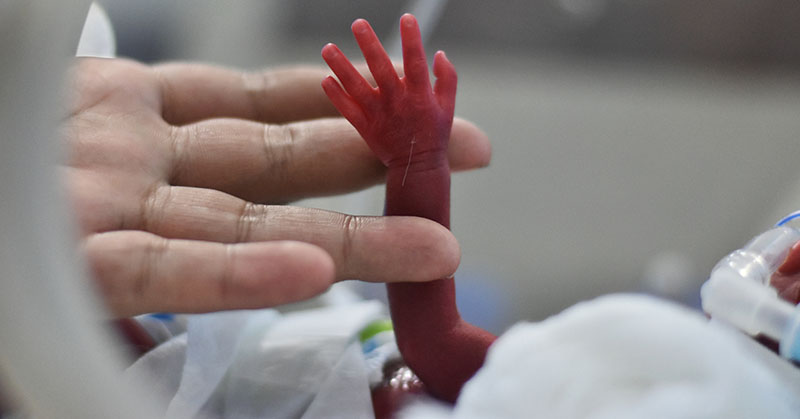NIH-funded study also finds that both groups had similar neurological development

Compared to their formula-fed counterparts, extremely preterm infants fed donated human milk had half the rate of necrotizing enterocolitis, a common life-threatening condition of the intestines, according to a study funded by the National Institutes of Health (NIH). There were no differences in neurological development between infants fed donated human milk and those fed formula. Infants who received formula also grew slightly faster than those receiving donor milk.
The study was conducted by Tarah T. Colaizy, M.D., M.P.H., and colleagues at 15 Neonatal Research Network 
Background
Preterm birth—before 37 weeks—is the most common cause of infant death and the leading cause of long-term disability in children. Extremely preterm infants (born before 29 weeks) are at high risk for neurodevelopmental impairment and necrotizing enterocolitis, in which the lining of the intestines becomes inflamed. Research shows that those fed breastmilk from their own mothers have better neurodevelopmental outcomes than those fed infant formula. However, milk from their mothers is not always available. In these cases, pasteurized human milk fortified with essential nutrients is often given to extremely preterm infants, but little research had been conducted on whether it is better than formula for infants’ neurodevelopment.
Results
Researchers randomly assigned 483 infants born before 29 weeks of pregnancy or who weighed less than 1,000 grams (about 2.2 pounds) at birth to receive formula or donated human milk. Some infants in each group were given their mothers’ milk; this was in small amounts, as their mothers either stopped producing milk before 21 days or could only produce a small supply.
Infants were fed these diets until either hospital discharge, for 120 days, or death—whichever came first. When the infants reached the equivalent of 22 to 26 months of development (corrected for their prematurity) they were tested with the Bayley Scales of Infant Development, a test used to identify children at risk of developmental delays.
The average cognitive score for the donor milk group was 80.7, compared to 81.1 for the formula group, amounts that did not differ significantly. The average score for full-term infants the same age is 100. Similarly, language scores and motor scores did not differ significantly between groups. Among the 114 infants who did not receive any maternal milk, the cognitive score was 80.2 in the donor milk group versus 80.9 in the formula group, also a statistically insignificant difference.
Fifty-four infants died before they could be tested: 29 (13%) in the donor milk group versus 25 (11%) in the formula group—also statistically insignificant.
Donor milk-fed infants grew more slowly than formula fed infants: an average of 22.3 grams per kilogram per day, versus 24.6 grams per kilogram per day.
Necrotizing enterocolitis developed in 10 infants (4.2%) in the donor milk group, compared to 22 infants (9%) in the formula group.
Significance
The authors concluded that neurodevelopmental outcomes did not differ between infants fed donor human milk compared to those fed formula. They noted, however, that those fed donor milk had half the rate of necrotizing enterocolitis as those fed formula. This finding, they wrote, suggests that donor human milk, like maternal milk, can reduce the risk of necrotizing enterocolitis compared to formula.
Reference
Colaizy, TT, et al. Neurodevelopmental outcomes of extremely preterm infants fed donor milk or preterm infant formula. JAMA. 2024.

 BACK TO TOP
BACK TO TOP